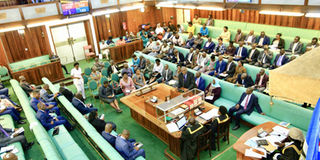Court quashes MPs power to raise own pay

Blocked. MPs debate during a plenary session on June 23. PHOTO BY DAVID LUBOWA
What you need to know:
- Court also decided that whereas minister Isaac Musumba in 2001 moved a resolution to vary MPs remuneration, he did so as a member of the Parliamentary Commission, not as minister or representative of the Executive as envisaged under the Constitution.
The Supreme Court in a landmark judgment yesterday decided that Members of Parliament cannot unilaterally increase their remuneration without involvement of the Executive.
In a unanimous decision, a coram of seven judges of the highest appellate court upheld a 2016 Constitutional Court verdict that declared Section 5 of the Parliament (Remuneration of Members of Parliament) Act “unconstitutional.”
“It is evident that if Section 5 of the Act is left on our statute books, it is bound to be used by Parliament to violate the Constitution,” the judges led by Chief Justice Bart Katureebe ruled.
Other justices on the panel included Stella Arach-Amoko, Rubby Opio-Aweri, Faith Mwondha, Paul Mugamba, Augustine Nshimye and Jotham Tumwesigye.
They ruled that MPs can increase their pay only through a substantive Bill or Motion introduced by the Executive that constitutionally is the one financial authority in charge of revenues and expenditure in the country.
The court also decided that the impugned Section 5 of the Parliament (Remuneration of Members of Parliament) Act and Article 85 of the Constitution, which empowers Parliament to determine emoluments of its members, ought to be read together with Article 93 of the Constitution which bars legislators from enacting a Bill that imposes charge on the Consolidated Fund if not introduced by the government.
Constitutional obligations
“The idea is that the appellant (Parliamentary Commission) should not increase the emolument of members of Parliament in disregard of the mandatory requirement under Article 93 because of Articles 82 and 85 of the Constitution to together with the impugned section 5 of the Act. The Constitutional Court, therefore, made the right decision (to declare the provision unconstitutional) and it cannot be faulted,” the judges said.
“In the result, we find no merit in this appeal and dismiss it accordingly. We award the costs of the appeal to the respondent,” they added.

Chief Justice Bart Katureebe
In 2011, a one Wilson Mwesigye, described in court papers as a “concerned citizen from Mubende,” petitioned the Constitutional Court to challenge decisions of the Parliamentary Commission to increase lawmakers’ pay based solely on Section 5 of the impugned Act and Article 85 of the Constitution.
The Parliamentary Commission, which is responsible for welfare and recruitment at Parliament, and the Attorney General, the government chief legal advisor, were the respondents in the initial case determined by the Constitutional Court.
Dissatisfied with the Constitutional Court verdict, the Parliamentary Commission represented by its chief legal officer, Mr Solomon Kirunda, appealed to the highest court in the land. The Attorney General declined to appeal.
Court also decided that whereas minister Isaac Musumba in 2001 moved a resolution to vary MPs remuneration, he did so as a member of the Parliamentary Commission, not as minister or representative of the Executive as envisaged under the Constitution.
Mr Kirunda had argued that Parliament under Section 5 of the Parliament (Remuneration of Members of Parliament) Act and Article 85 of the Constitution had powers to increase its members’ salaries and that nothing the MPs did violated the supreme law of the land.
That power is for lawmakers to approve or reject government’s spending proposals and not allocate the resources, the court held.
There have been instances of legislators increasing their pay over the years without recourse to the Executive.
The most recent was in April, this year, when the lawmakers, who number 459 in the 10th Parliament, increased their allowances by 39 per cent and that of parliamentary staff by 15 per cent, citing increasing cost of living. Mr Chris Obore, the director of Communication and Public Affairs at Parliament, said MPs, as makers of the law, would respect the court decision.
“The law that has been there purportedly to allow MPs increase their salary has been a redundant law [because] MPs have not unilaterally increased their pay even when the law was there,” he said by telephone.
“It is not true that they (lawmakers) have been increasing their payments,” he added.
Parliament’s take
Mr Obore also said MPs could not have raised their salaries unilaterally because the Parliamentary Commission, which makes the decision, has among its members the Prime Minister, who is the Leader of Government Business, and the Finance minister --- both members of the Executive.
Ms Cissy Kagaba, the executive director of the Anti-Corruption Coalition Uganda, welcomed the court decision but doubted whether MPs would respect it because they are “greedy and self-centred.”
“They would come up with other loopholes to justify their illegality,” she said.




